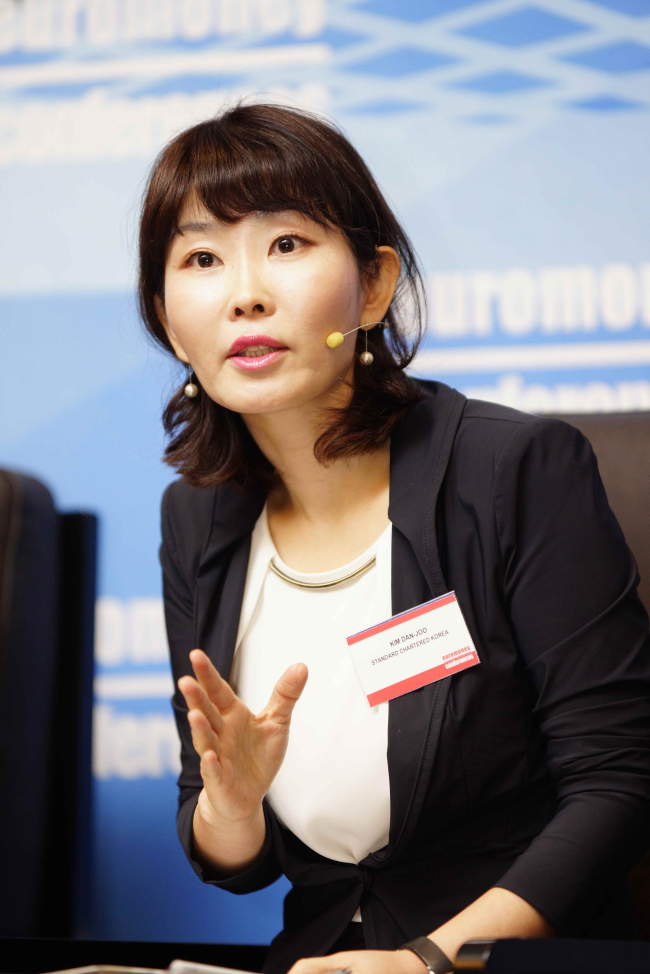[Herald Interview] ‘Seoul has good chance of becoming offshore RMB hub’
By Korea HeraldPublished : Sept. 30, 2014 - 20:18
South Korea’s renmibi market is still largely passive, especially considering its trade volume with China, but the country is considered a leading candidate as a global offshore hub for the Chinese currency, according to a transaction banking expert.
“Korea’s currency market is going through a transition phase, which means that most local banks realize the importance of the renmibi trade but still lack the necessary manpower and expertise,” Kim Dan-joo, the head of transaction banking at Standard Chartered Bank Korea, told The Korea Herald in an interview.
“But South Korea, with its advanced financial infrastructure, trade volume and geographic proximity to China, is quite ready to face the change ― more than most people may think.”
Kim is one of the nation’s top experts in transaction banking, specializing in the Chinese currency market.
Her words came in line with the government’s recent set of efforts to promote Korea as an offshore renmibi hub, a role currently played by Hong Kong and Taiwan.
“Should Korea succeed in becoming the offshore renmibi hub, the country’s financial industry shall make a leap forward,” Shin Je-yoon, the Financial Services Commission chairman, said in April.
Also, President Park Geun-hye and her Chinese counterpartk Xi Jinping agreed during their July summit to open a direct won-renmibi trade market in the near future.
A special task force is in operation at the Bank of Korea to execute the pledge.
“The moves to activate the renmibi market here may seem belated, considering the close diplomatic ties and the total trade volume between Korea and China,” Kim said.
“Korea’s currency market is going through a transition phase, which means that most local banks realize the importance of the renmibi trade but still lack the necessary manpower and expertise,” Kim Dan-joo, the head of transaction banking at Standard Chartered Bank Korea, told The Korea Herald in an interview.
“But South Korea, with its advanced financial infrastructure, trade volume and geographic proximity to China, is quite ready to face the change ― more than most people may think.”
Kim is one of the nation’s top experts in transaction banking, specializing in the Chinese currency market.
Her words came in line with the government’s recent set of efforts to promote Korea as an offshore renmibi hub, a role currently played by Hong Kong and Taiwan.
“Should Korea succeed in becoming the offshore renmibi hub, the country’s financial industry shall make a leap forward,” Shin Je-yoon, the Financial Services Commission chairman, said in April.
Also, President Park Geun-hye and her Chinese counterpartk Xi Jinping agreed during their July summit to open a direct won-renmibi trade market in the near future.
A special task force is in operation at the Bank of Korea to execute the pledge.
“The moves to activate the renmibi market here may seem belated, considering the close diplomatic ties and the total trade volume between Korea and China,” Kim said.

“Up to now, there has been much hesitation (towards renmibi trade), since an additional currency in the market may also mean an increased level of foreign exchange risk.”
But highlighting the need for new trade, the ratio of renmibi deposits have soared rapidly over the past months, since FSC chief Shin officially brought up the issue in London in April, she added.
According to the Bank of Korea, the total amount of renmibi deposits here was 20 billion won ($18.9 million) as of the end of August, up 3.8 billion won from the previous month.
Companies operating in Korea have long been searching for an alternative high-yield investment currency.
“Korea has been exposed to low interest rates for years, which makes it only too natural for corporations to seek profit opportunities in Chinese banks and thus the renmibi market,” Kim said.
“Now, not only conglomerates but also small export companies, display a high level of awareness of the Chinese currency.”
The first step is to encourage commercial banks and companies to use the renmibi as one of their key trade currencies, she claimed.
Once the market picks up confidence in using renmibi, it will create a demand for renmibi-based derivatives, which will then attract foreign companies to come and use the currency in Korea, according to Kim.
By Bae Hyun-jung (tellme@heraldcorp.com)
-
Articles by Korea Herald







![[KH Explains] Hyundai's full hybrid edge to pay off amid slow transition to pure EVs](http://res.heraldm.com/phpwas/restmb_idxmake.php?idx=644&simg=/content/image/2024/04/18/20240418050645_0.jpg&u=20240419100350)







![[From the Scene] Monks, Buddhists hail return of remains of Buddhas](http://res.heraldm.com/phpwas/restmb_idxmake.php?idx=652&simg=/content/image/2024/04/19/20240419050617_0.jpg&u=20240419175937)

![[KH Explains] Hyundai's full hybrid edge to pay off amid slow transition to pure EVs](http://res.heraldm.com/phpwas/restmb_idxmake.php?idx=652&simg=/content/image/2024/04/18/20240418050645_0.jpg&u=20240419100350)

![[Today’s K-pop] Illit drops debut single remix](http://res.heraldm.com/phpwas/restmb_idxmake.php?idx=642&simg=/content/image/2024/04/19/20240419050612_0.jpg&u=)